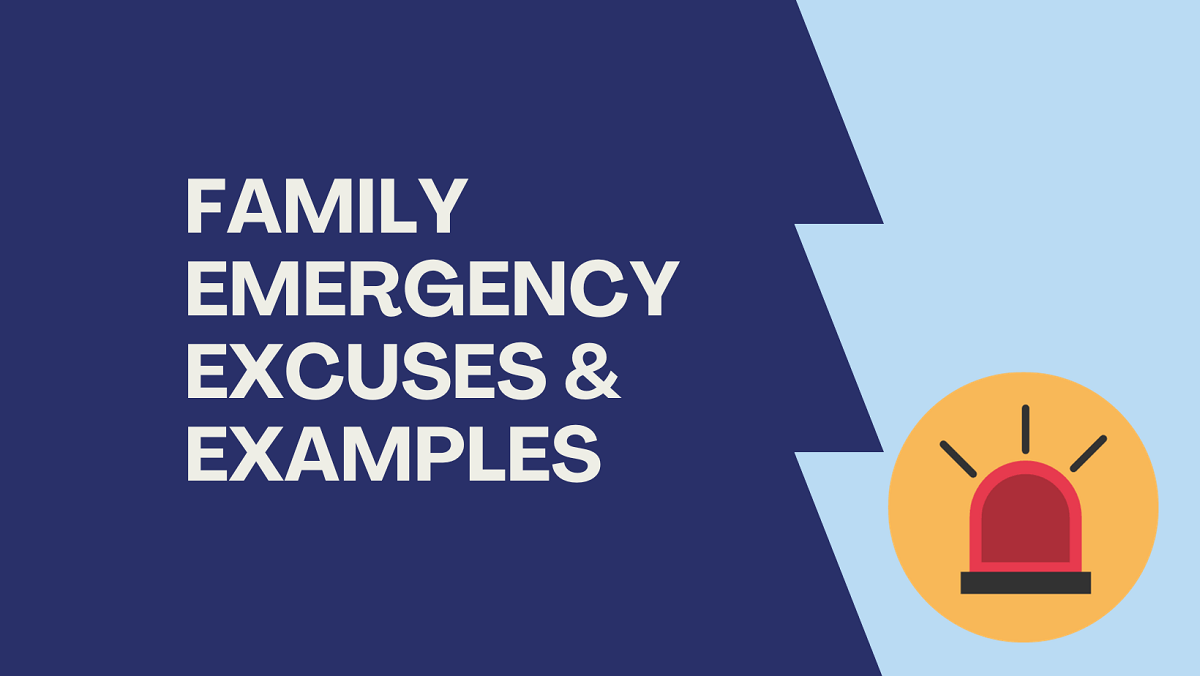Physical Address
304 North Cardinal St.
Dorchester Center, MA 02124
Physical Address
304 North Cardinal St.
Dorchester Center, MA 02124

We all find ourselves dealing with unexpected family emergencies from time to time. When a crisis strikes involving your loved ones, it’s understandable that other commitments like work or school may need to temporarily take a backseat. However, you still need to communicate these sudden changes in plan to employers, teachers, or other people counting on you.
Having a convincing excuse that explains your family emergency without raising suspicions is key. The details you provide should align with the severity of the situation – too much information for a minor issue may set off red flags. Use these tips and examples to craft a family emergency excuse appropriately and handle this unfortunate situation with care and grace.
Table of Contents
Family emergencies cover a wide range of situations, from minor to severe. Having to miss an obligation for a family matter is generally acceptable in circumstances like:
Sick child – Child woke up with fever, vomiting, etc and needs to stay home from school with parent supervision.
Babysitter cancellation – Your regular babysitter calls in sick last minute while you are scheduled to be at work.
Doctor appointment for child – Your child suddenly gets an appointment scheduled with pediatrician during work hours.
School event for child – A mandatory school event for your child like parent-teacher conferences gets scheduled during your work hours.
Elderly parent injury – Your elderly parent slips, falls, or has an accident requiring immediate medical attention or supervision.
Hospitalization of family member – Parent, spouse, child, or sibling is unexpectedly hospitalized for injury, illness, surgery, etc.
Mental health crisis – A loved one experiences a mental health emergency like suicidal thoughts, anxiety attack, episode related to depression/bipolar disorder etc.
Pet emergency – Your pet has an emergency like ingesting poison or being hit by a car, requiring urgent vet attention.
Home crisis – Burst pipe flooding home, electrical fire, break-in, or other crisis requiring you to be home to meet with emergency personnel.
Car accident – Spouse, child or other immediate family was in wreck and needs to be picked up from scene, taken to auto shop, or requires parent/spouse at hospital.
Death in family – Loved one passing away unexpectedly, requiring taking care of funeral arrangements and family matters.
Domestic violence – Partner was physically violent requiring medical care, counseling, legal help, or to relocate for safety.
Weather emergency – Snow storm, hurricane or other severe weather prevents travel or access to office/school.
COVID-19 illness/exposure – Either you or an immediate family member has tested positive for COVID-19 or has been directly exposed, requiring quarantine.
If it’s a minor emergency that simply requires you to be late or miss one commitment, keep details brief. For severe emergencies resulting in multiple days away, providing more context helps convey the gravity of the situation.
When crafting your excuse message, follow these guidelines:
There are a few important guidelines when providing a fake family emergency excuse:
To give you a better idea of how to communicate your family emergency properly, here are some examples across different mediums:
“I apologize for the late notice, but a family emergency has come up this morning that requires my attention. I may need to take the day off today. I’ll provide more details when I can. Thank you for your understanding.”
“I regret to inform you that my father has been hospitalized after a heart attack last night. I need to be with my family today and likely the next few days as he goes through some medical procedures and we handle this crisis. I apologize for the short notice and greatly appreciate your understanding during this difficult time for my family. I will be in touch when I know more about when I can return to work.”
“Hi [name], I’m calling because there’s been a family emergency I need to deal with. My grandfather was rushed to the hospital early this morning after falling down the stairs at home. They think he may have broken his hip. I need to join my family at the hospital to handle this situation. I won’t be able to make it into work today, and possibly longer depending on his condition. I’m so sorry for calling so last minute but I wanted to let you know right away. I appreciate you being accommodating with this challenging circumstance. I’ll follow up with more details as soon as I can.”
We all hope to avoid family crises, but the reality is they do happen. When an emergency strikes, alert those counting on you as soon as possible. With the right messaging conveying empathy, responsibility and just the crucial facts, most people will be understanding. Try to be honest whenever you can, and resort to white lies sparingly. Clear communication and compassion for how the situation impacts others will go a long way in preserving important relationships, even in difficult times.
I hope these tips help you gracefully navigate any real family emergencies that arise, or craft an ethical excuse when absolutely necessary.